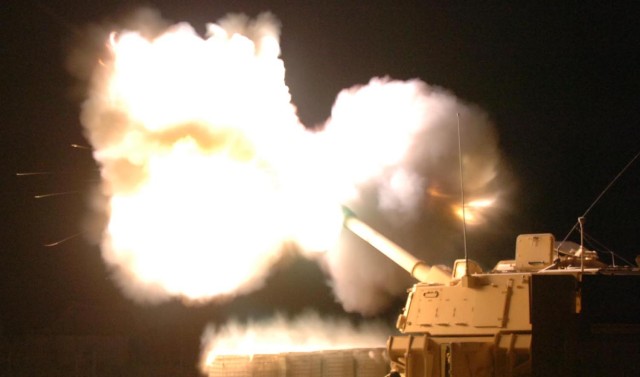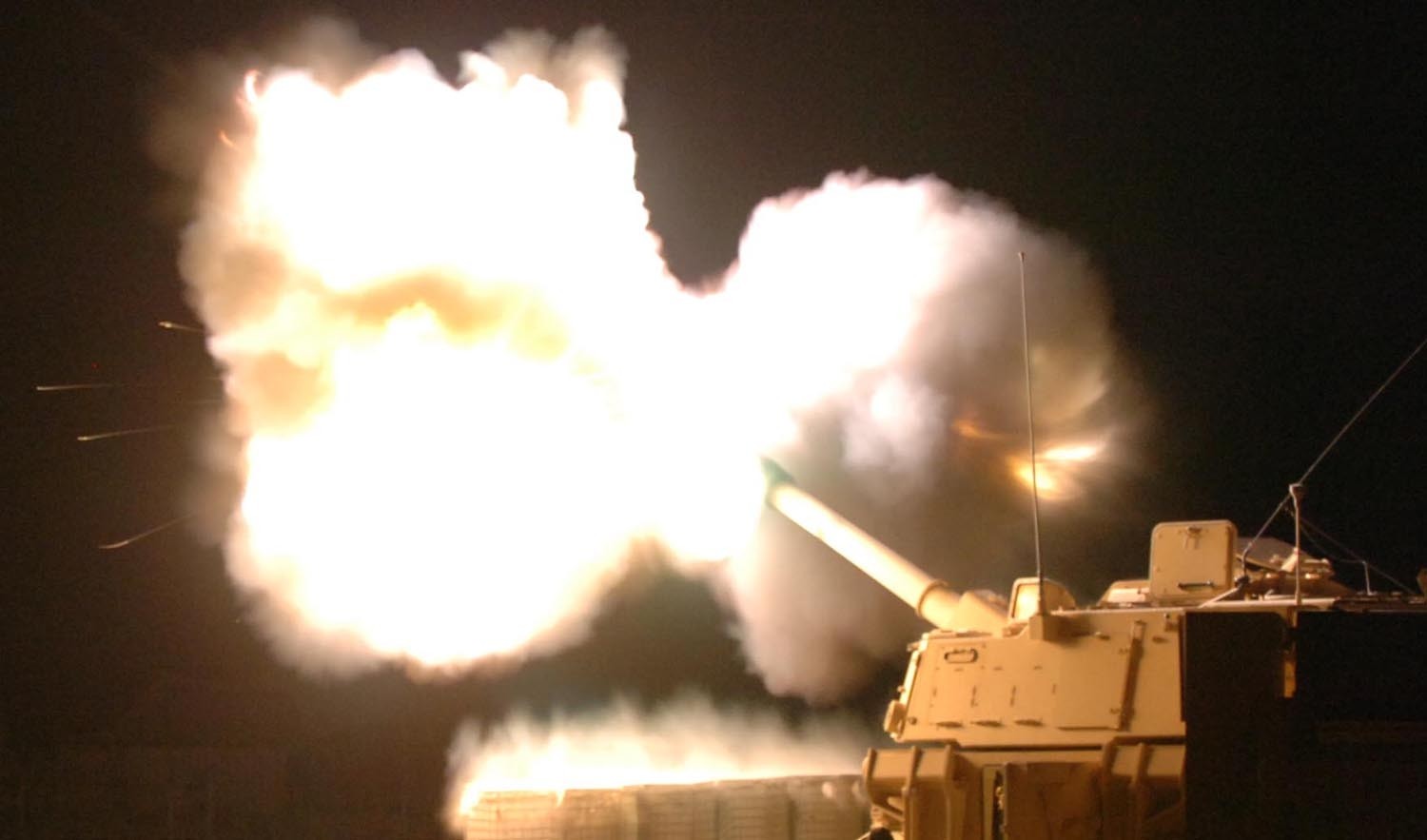
WASHINGTON (American Forces Press Service, Aug. 16, 2007) - Operations Phantom Strike, Lightning Hammer and Marne Husky, combined operations launched this week by coalition and Iraqi forces, are using the information and intelligence gained through operations over the summer to more effectively target insurgents throughout Iraq, a Multinational Force Iraq spokesman said yesterday.
Since the surge of operations began in June, coalition and Iraqi forces have advanced considerably, cleared key Iraqi neighborhoods, and formed relationships with citizens in those neighborhoods, Army Brig. Gen. Kevin Bergner told reporters in Baghdad. Phantom Strike will build on those successes and continue to target terrorists who kill innocent Iraqi citizens and try to disrupt the political process, he said.
Brig. Gen. Bergner noted that intelligence gathered over the last eight weeks "sets different conditions and sets different opportunities for coalition and Iraqi forces now. We have new sources of information, a cumulative base of intelligence, and that gives you the opportunity to focus your strike operations in a different way."
Brig. Gen. Bergner highlighted some progress made in recent weeks, including:
-- In July, 18 senior al Qaeda in Iraq leaders were captured or killed, and hundreds of lower-level operatives were captured or killed. Six of these individuals were senior emirs who were in charge of geographic areas; seven were foreign terrorists or weapons facilitators; three were cell leaders; and two were leaders of media and propaganda networks.
-- In the first two weeks of August, five al Qaeda senior leaders were killed or captured from Mosul, Salah Ad Din, Samarra and Baghdad.
-- On Aug. 4 in Najaf, Iraqi forces captured a "special groups" leader who had facilitated cross-border training and recruited individuals by paying them to emplace improvised explosive devices.
-- On Aug. 5, Iraqi and coalition forces captured a special groups network leader who oversaw five terrorist groups in Baghdad.
-- On Aug. 7, Iraqi and coalition forces in eastern Baghdad killed 30 members of Iranian-backed "special group" terrorist cells and detained 12. On the same day, Iraqi and coalition forces captured an eight-person kidnapping cell with its leader located in Baghdad.
-- In Baqubah, this weekend marked the third consecutive trip by central government leaders to help restore services and begin reconstruction.
-- On Aug. 12, more than 500 Anbar men joined the ranks of the Iraqi security forces in the first graduation held at the newly reopened Habaniyah police training center.
-- This week, the central criminal court of Iraq convicted a Libyan foreign terrorist who admitted to entering Iraq illegally via Egypt and Syria and who, in April, attempted to drive a truck bomb into an Iraqi police station.
Another sign of progress, Brig. Gen. Bergner pointed out, is the willingness of Iraqi citizens to step forward and help establish security. In certain neighborhoods in Baghdad, Iraqi citizens man checkpoints with the Iraqi army and provide tips that lead to terrorist safe houses and weapons caches.
Despite this progress, insurgents are still capable of staging large-scale attacks, such as bombings Aug. 14 in northern Iraq, Brig. Gen. Bergner said. These attacks are a reminder that the enemy the coalition faces in Iraq will kill innocent people to further their means and that progress in Iraq will continue to be challenged by these terrorists, who have no regard for human life, he said.
"It\'s very difficult, but we're continuing to pressure those networks and to encourage Iraqi people to come forward, work with their security forces, work with their government, because that's the fundamental thing that helps deal with the kinds of terrorist problems that are plaguing the Iraqi people," he said.
Coalition and Iraqi forces still face a hard fight in Iraq, Brig. Gen. Bergner acknowledged. He cautioned that progress will not be "like turning on a light switch," but will be gradual and sometimes uneven.
"While we continue to make progress against the sources of violence, it is the Iraqi people who are taking courageous stands in their local communities," he said. "We see it through the meetings and pledges of tribal leaders, we see it through the development of local security forces that have joined the ranks with their brothers to fight al Qaeda, and we see it in the commitment between local government leaders and their citizens and their security forces."
<b>Other Operations</b>
Iraqi and coalition forces launched combat offensives dubbed "Operation Marne Husky" yesterday and "Operation Lightning Hammer" Aug. 13, to eliminate enemy sanctuaries in Iraq.
Operation Marne Huskey is an aviation-based combat offensive that plays a key part in Multinational Corps Iraq's overall "Operation Phantom Strike" and will target militant safe havens and weapons smugglers to choke the flow of bombs and weapons reaching the Iraqi capital, military officials said.
"The combination of aviation and ground forces will allow Task Force Marne the ability to target areas that the enemy deems as safe," said Lt. Col. Robert Wilson, executive officer of 3rd Combat Aviation Brigade, 3rd Infantry Division. "We're leveraging the ability of the helicopters with the infantry Soldiers to take the fight to the enemy and promote security for the people of Iraq."
The operation is designed to disrupt insurgents who fled the towns of Salman Pak and Arab Jabour in front of earlier U.S. offensives. Marne Husky is a change for troops in central Iraq in that the unit with primary responsibility is the aviation brigade.
Instead of conducting linear maneuver across the battlefield, the operation will consist of a series of sustained air assaults, coordinated from the sky and employing numerous platforms operating in synch. Black Hawk and Chinook helicopters will deliver Soldiers to where they're needed within 30 minutes of identifying a target under constant support from Kiowa and Apache air weapons teams, officials said.
Intelligence has become a huge asset in Task Force Marne's area of responsibility as both Sunni and Shiia Iraqis come forward with tips and the U.S. positions its own internal assets to gather information. Marne Husky will use combat aviation capabilities to press that advantage, expanding the U.S. reach as it quickens response times to restrict extremists' maneuverability in the area, officials said.
Operation Lightning Hammer kicked off with a powerful barrage of artillery fire and air strikes on carefully selected targets in Diyala province, sending al Qaeda a strong message that they have no safe haven there, officials said.
More than 300 artillery munitions, rockets and bombs were dropped throughout the night and into morning, blocking al Qaeda movement and suppressing suspected al Qaeda targets. This barrage set the stage for subsequent nighttime air and ground assaults into the Diyala River Valley by U.S. aviation units, officials said.
These forces combined with other units already conducting Operation Lightning Hammer missions elsewhere in Diyala and Salah ad Din provinces, totaling about 10,000 coalition forces and 6,000 Iraqi security forces.
"Enemies of Iraq will not get a chance to rest or hide in Diyala province," said Army Brig. Gen. Mick Bednarek, deputy commander for operations, Task Force Lightning and Multinational Division North. "We are moving forward together for the benefit of the Iraqi people, and this operation proves the growing strength of Iraq's partnership with the coalition."
Elsewhere yesterday, coalition forces raided three buildings in Kirkuk while hunting an al Qaeda leader known for extortion, kidnapping, weapons trafficking and directing car bombings. Ground forces detained two suspected terrorists during the operation.
"Whether al Qaeda in Iraq is using Iraqis or foreigners to conduct their brutal attacks, we will target those criminals who terrorize the Iraqi people," said Army Lt. Col. Christopher Garver, Multinational Force Iraq spokesman. "Our operations are degrading the ability of the terrorists to operate freely."
(Compiled from Multinational Force Iraq, Multinational Corps Iraq and Combined Joint Special Operations Task Force Arabian Peninsula news releases.)

Social Sharing